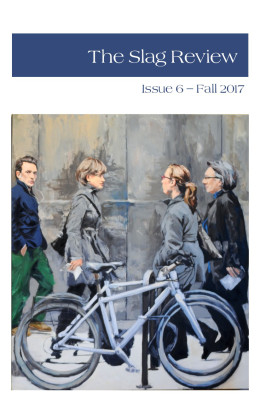The Slag Review – Fall 2017
In the “About Us” section of The Slag Review, the editors describe how the journal is “a little off-kilter,” and how the work they “accept will reflect that.” Readers can be thankful that the credo really shines forth in the Fall 2017 issue of the journal. There’s fiction, nonfiction, and poetry and they all, in their own ways, exhibit an off-kilter and unique sensibility.
In the “About Us” section of The Slag Review, the editors describe how the journal is “a little off-kilter,” and how the work they “accept will reflect that.” Readers can be thankful that the credo really shines forth in the Fall 2017 issue of the journal. There’s fiction, nonfiction, and poetry and they all, in their own ways, exhibit an off-kilter and unique sensibility.
In the poem, “Salvador Dali is Forever” by Howie Good, the speaker gives us a brief insight into an unnamed crisis told in three paragraph-stanzas. There is mention of an Armageddon here and, judging by the number of environmental references, it’s unsurprisingly going to be surreal in nature. The poem’s bizarre and surreal atmosphere conjures up images akin to Dali’s famed melting-pocket-watch painting, “The Persistence of Memory.” There are killer lines here such as in the first stanza when the speaker says: “The conversation doesn’t go any / further because nearly everyone is out in the sunshine watching the birds die off.” And, like any good piece of creative writing, the piece ends on a high note with this line: “Maybe if you and I can stand very, very still, bits of daylight will / reappear, bright stupid confetti.”
In Therese Masotta’s poem, “The Gospel of Love According to John,” the off-kilter sensibility shines through in the clever conceit of the poem’s structure. It essentially functions, not as a “break-up” poem, per se, but more of a “please-don’t-break-up-with-me” poem and is written in the style of a Bible chapter, replete with the first word of the first verse being capitalized. The “speaker” here (presumably the titular “John”) presents his case with each verse as to why his lover shouldn’t leave, hitting an amusing high-note with verse 8: “So, on your knees now, and repeat this / prayer after me: I will not ever leave / Because I am a good person.” The tongue-in-cheek humor and formal inventiveness make this a fun, memorable poem.
An unconventional patina shows up elsewhere in the issue, as with James Kidd’s fiction piece titled “Salt.” This story, told in the second person, offers up some stark imagery and has the feel of a prose poem. Images of a homely scene of a mother’s borscht soup and a past life are contrasted with desolate and barren, unforgiving natural landscapes. The story works on both a metaphorical and literal level: this “you” protagonist is either dying in a desert or experiencing something akin to a spiritual death of some kind. Either way, it’s compelling and the second person point-of-view enhances the detached and solemn quality of the narrative.
In reviewing any given literary journal, it’s usually difficult to pick out favorite pieces. I don’t want to invoke the oft-cited cliché: “ooh, it’s like asking me to pick a favorite kid.” That said, Jerome Daly’s prose poem “Before Breakfast” is probably my favorite if only because I’m a sucker for really good slice-of-life pieces. This one is about an unnamed speaker/protagonist walking around a city in the early dawn hours, enjoying his cigarette. The piece is a detailed snapshot of solitude in the city, with an almost noir-ish quality. A sense of time and place is well-captured here, even though we don’t quite get an exact location (except for mention of a few palm trees). We get glimpses of this “secret” life: a medical marijuana merchant pushing his cart, a man spraying down the sidewalk in front of a Mexican restaurant, a pink-haired woman stepping out of a car. The speaker, looking through the window of the hotel lobby, notices a family getting the continental breakfast; the youngest girl “plays with her doll, happy to be by herself.” The speaker sees a contentment with being alone (rather than lonely) in the young girl and he appreciates this. I appreciate the way Jerome Daly captures the beauty in those ephemeral moments that stay with us long after we are done exploring.
There are a number of other pieces in this issue that deserve a quick shout-out: Kim Peter Kovac’s nonfiction piece, “knifeknifeknife” about the fluidity of language and labels (among many other things); Maureen Daniels’s “Triolet at the B Cafe,” a lovingly sad expression of longing; John Grey’s bluntly humorous “Let Me State This in Words Only I Can Understand”; and Annie Blake’s deceptively complex story of a relationship, “How I Swallowed a Snake.” This issue is stacked with the kind of writing that leaves you glad to have read it a first time, and eager to revisit.
[slagreview.com]





